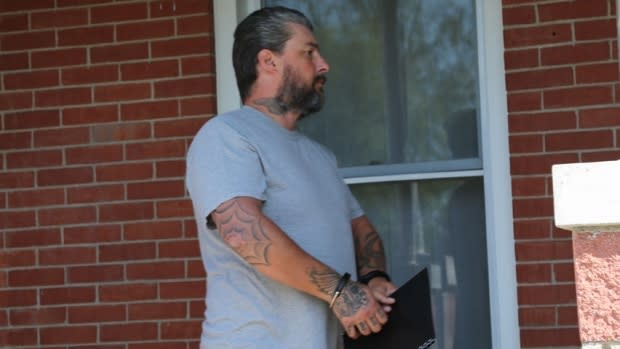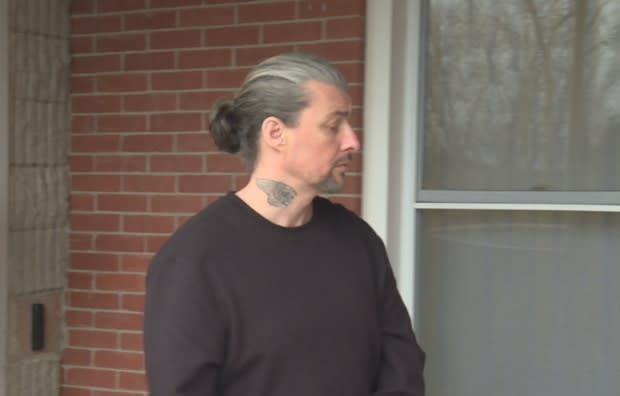New Brunswick Hells Angels member granted day parole
A man the police describe as a full-patch member of the Hells Angels New Brunswick Nomads chapter has been granted day parole, despite opposition from local police and Correctional Service Canada.
Police believe Robin Moulton returned to his home province of New Brunswick in 2016 not just to sell motorcycle apparel, but with the purpose of setting up a chapter for Hells Angels, according to an Oct. 3 Parole Board of Canada decision.
The New Brunswick Nomads chapter is part of an eastern expansion for Canada's largest and most powerful outlaw motorcycle gang, which also established a chapter in Charlottetown this year.
Moulton, 50, was sentenced last October to 4½ years in prison for possession of cocaine for the purpose of trafficking and possession of a drug press with the intention of producing or trafficking a substance.
With credit for time held in custody after his arrest, Moulton's sentence amounted to two years, nine months and 15 days, parole board records show.

The parole board decision doesn't say where he's been serving the prison sentence or where he'll be on day parole.
Moulton was charged in August 2017 after police pulled his car over near Woodstock and found a 10-ounce brick of cocaine in his car.
At his sentencing, the court heard how police had Moulton under surveillance for months as he accessed storage lockers in Fredericton and Woodstock.
After covertly installing a motion-activated camera inside a locker in Woodstock, police saw Moulton using a hydraulic press to compress a white powdered substance into bricks, place the substance into clear bags and then into a duffel bag before leaving the locker.
The cocaine seized from the vehicle was believed to have 35 per cent purity with a value of $12,000 to $24,000.
A member of Hells Angels for 'prolonged period'
The sentence was Moulton's second federal prison term, according to the parole board. In 2008, he was sentenced to 64 months in prison for two counts of trafficking cocaine and one of possession of a prohibited restricted firearm with ammunition.
Moulton has no other criminal convictions, but he's been a member of the motorcycle gang "for a prolonged period," the records say.
The parole board described Moulton as being "of Indigenous descent," but he didn't grow up on a reserve or practise his culture growing up.
"Your file indicates that you experienced a disconnect by not growing up on a reserve or practising traditional ceremonies and teachings to problem solve and develop appropriate coping skills," the decision says.
"Your lack of community connectivity may have led you to value the [camaraderie], power and influence associated with your OMG [outlaw motorcycle gang] affiliation, while such is also an indication of thrill-seeking behaviour on your part."
Moulton told the parole board he returned to Atlantic Canada to open a retail business, selling motorcycle apparel and other items.
But the business "is a well-known outlet supportive of your OMG," the parole board alleged, and sells clothing that refers to the Hells Angels through a numeral designation, 81. Only members are allowed to wear the Hells Angels logo.

"Police have encouraged people not to purchase apparel or other items containing this numeral designation, as they claim sales finance the OMG and wearing it indicates support for the OMG," parole board records say.
Police 'not supportive' of release
Correctional Service Canada ranked Moulton's "levels of accountability, motivation and reintegration potential" as medium.
The decision says Moulton has completed programming and participated in Indigenous ceremonies but has always been clear about having no intention of dissociating from Hells Angels, which he describes as his "social group."
In his application for day parole, Moulton said he wanted to continue on his "healing journey" by attending ceremonies and learning traditional medicines to reconnect with his Indigenous community. He also said he plans to attend college to upgrade his trade skills. Moulton is a Red Seal-trained chef and butcher.
If granted full parole, he wanted to move into a home he owns with his common-law partner.
But Correctional Service Canada doesn't support Moulton's release.
The decision says an unnamed "centre" suggested in Moulton's parole application won't accept him because of his ties to Hells Angels, while a halfway house in his "preferred release area" also won't allow him to live there.
While Correctional Service Canada "recognizes that you have completed programming, there is not enough information to suggest that your risk is manageable on a conditional release," the records say.

"They noted the fact that you do not intend to disassociate from the OMG and your plan to continue with your [redacted] clothing suggest a lack of internalization of skills and/or genuine effort to make pro-social changes."
Local police "are not supportive" of Moulton's return to the community on any type of conditional release, the board noted. A spokesperson for the New Brunswick RCMP declined to comment, saying "it would be inappropriate to comment on a court matter."
'Not a criminal organization,' Moulton says
In a written submission to the parole board, Moulton argued he presents a low-risk of reoffending and Correctional Service Canada's opposition to his release "is based on biased and prejudicial beliefs regarding the OMG."
"You note it is not a criminal organization, that membership is not illegal, that there was absolutely no evidence of any connection between your criminal acts, for which you take responsibility, and anyone in the OMG, and you wanted it noted that the judge in the court's decision did not accept the Crown's recommendation that this was to be a criminal organization offence, as you claim there was no evidence of any connection."
Moulton also said he was under "considerable stress" when he decided to traffic cocaine in 2016, "as a close friend had died in a violent manner" and he was under financial stress as he tried to start his business and support his children.
A friend, who is a lawyer, also spoke on Moulton's behalf and noted he's been a "model inmate" during his sentence.
"He believes that police put labels on the kind of group you are a part of, but there was no link between your current criminal actions and that organization," the decision says.

"He believes the media and the police sensationalize this connection for their own purposes."
Moulton's common-law spouse also spoke on his behalf, saying he's "a kind person who is a very good father to [his] children," while an institutional elder said Moulton has become more engaged in his Indigenous culture.
Full parole denied
The board denied full parole for Moulton but granted him day parole parole for six months.
In its decision, the board said Moulton has "the skills and tools to manage [his] risk in the community," and he has the ability to follow conditions. But the board also said Moulton's connection to the outlaw motorcycle gang is "concerning."
"However, the reality, as noted above, is a limited criminal history, a positive conditional release history, and without reliable and persuasive information to the contrary, the board accepts your description of your retail business."
While on day parole, Moulton will have to live in a community-based residential facility and won't have any leave privileges, meaning he must return to the facility each night.
He also must follow several conditions, including "not to associate with any person you know or have reason to believe is involved in criminal activity" and to provide "documented financial information" in order to prove his "finances are obtained through legitimate means."
He is not allowed to possess, purchase or consume drugs, has to look for a job and maintain it, stay within a territorial boundary set by his parole supervisor and "immediately report all intimate sexual and non-sexual relationships and friendships with females to your parole supervisor."
"You have been involved in many intimate relationships, and your co-accused for the current offences was an intimate partner at the time, although different from your current intimate partner; you reported your motivation to turn to trafficking was to support your five teenage children who have three different mothers," the decision
"The board believes it is important that your parole supervisor be aware of your intimate relationships or your risk of re-offending could increase."


